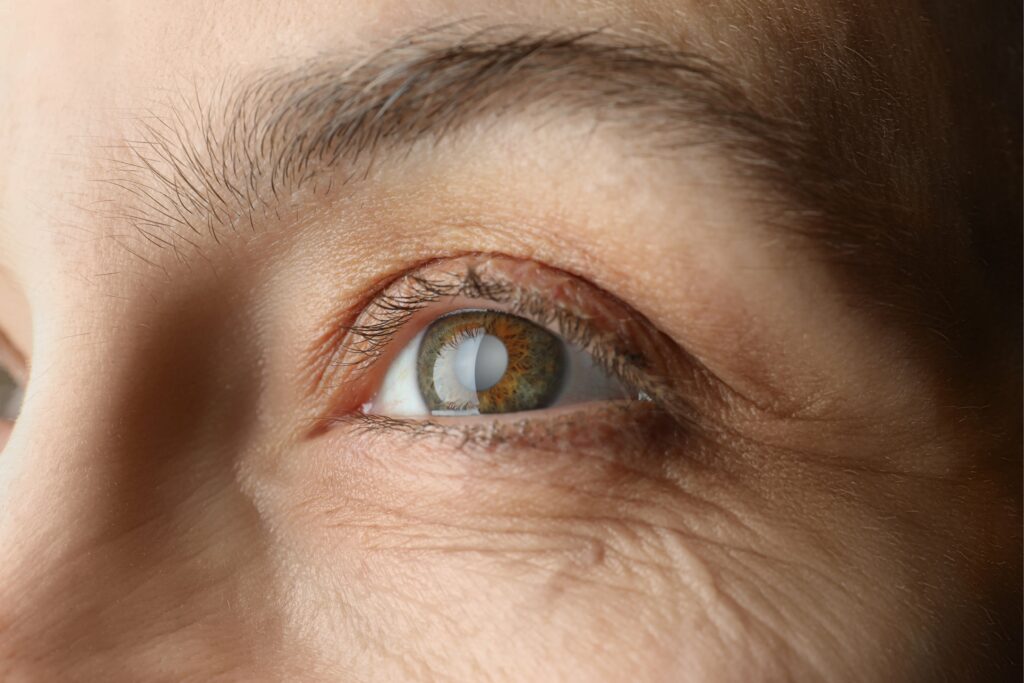Many eye conditions can affect your ocular health and vision, especially if left untreated. Regular eye exams can help identify these conditions before they progress.
Cataracts are one such eye condition. It occurs mainly in older adults, with vision worsening over time. Over half of all Americans over 80 have cataracts or had cataract surgery.
So, what happens if you don’t have cataract surgery to remove the cataract? Let’s find out by discussing cataracts, signs and symptoms, and the risks of not having them removed.
What are Cataracts?
A cataract is the clouding of the eye’s lens. As cataracts grow, they can make vision extremely difficult or impossible, which is why they’re the world’s leading cause of blindness.
The lens of the eye, behind the pupil, allows you to focus on objects at varying distances by changing their shape. As you age, proteins in the eye start to break down. When these proteins clump together, they create clouding of the lens.
As more particles clump together, the lens becomes less transparent, more cloudy, and rigid. Cataracts can occur in one or both eyes,
Cataracts are a normal part of the aging process, but other factors that can increase your risk of developing cataracts. These include:
- Diabetes
- Eye injury
- Eye surgery
- Excessive alcohol consumption
- Use of corticosteroids
- Smoking
- Family history of cataracts
- Radiation treatment
- Overexposure to the sun
Signs & Symptoms of Cataracts
Since cataracts develop gradually, symptoms are not always noticeable in the early stages or mild cataracts. As cataracts grow, symptoms can affect your vision and ability to carry out everyday activities.
Changes in your vision can present as:
- Blurry vision
- Colors look faded
- Poor vision at night
- Sensitivity to bright lights and glare
- Halos around lights
- Double vision at times
- Frequent changes in prescription
These symptoms aren’t exclusive to cataracts only. If you experience these symptoms, visit your eye doctor to rule out other conditions.
What Happens if Cataracts are Left Untreated?
Untreated or not removing a cataract can lead to vision impairment, loss, and possibly blindness. Even though surgery is the only treatment for removing cataracts, this doesn’t mean everyone with cataracts requires surgery.
Some people with mild cataracts can correct their vision with prescription glasses and contact lenses. They can also manage with brighter lighting, anti-glare sunglasses, and magnifying lenses. Sometimes, even mild cataracts can worsen rapidly.
As symptoms progress, you risk the following if you don’t have a cataract removed:
- Inability to carry out your job
- Inability to enjoy activities or reading
- Inability to drive in low light conditions or at night
- Increases the risk of falls or injuries
Waiting too long to have cataract surgery can result in a mature or hyper-mature cataract that can lead to surgery complications. When cataracts occur at a younger age (congenital cataracts) or due to other causes, cataracts can progress faster and may require timely surgery.
Cataract Surgery
Stronger lens prescriptions can help provide clearer vision for those with cataracts. However, cataract surgery is the general recommendation when your vision is significantly affected.
Cataract surgery involves removing the clouded lens and replacing it with an artificial lens, also called an intraocular lens or IOL. If both eyes need cataract surgery, two separate procedures are required.
What to Do If You Don’t Have Your Cataract Removed
To restore your vision, it’s generally better to have cataract surgery soon after you show symptoms instead of waiting until it impairs visual clarity. However, many people choose to delay having their cataracts removed.
Always speak to your eye doctor about options, as delaying surgery can depend on various factors, including how fast your cataracts progress. Here are some things to keep in mind if you don’t have a cataract removed:
- Have regular eye exams to monitor your cataracts
- Ensure you have the right prescription to correct your vision
- Discuss the benefits and complications of delaying cataract surgery
- Update your eye doctor when you experience changes in vision
- Wear sunglasses to protect your eyes from UV light
- Address other health conditions, such as diabetes
Cataract Surgery for Clearer Vision
While cataract surgery can greatly improve one’s vision, many people choose not to have them removed if it doesn’t affect their daily life. On the flip side, waiting too long can lead to significant vision impairment.
So, if you experience any symptoms, such as difficulty seeing at night, trouble reading, or blurred vision, book an appointment with Perry & Morgan EyeCare immediately.



